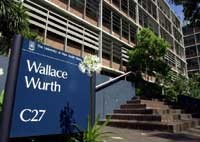UNSW Medicine Information and Assistance
|
|
This section of the Handbook is designed as a detailed source of information in all matters related to UNSW Medicine's Undergraduate Programs. If you require advice about enrolment, degree requirements, progression within Programs or with any other general Faculty matter, contact one of the following people located in the Medicine Education and Student Office (map reference C27), UNSW Medicine:
|
|
|
Undergraduate
Zara Cupina Manager, Student Administration
Medicine Education & Student Office
Tel: +61 (2) 9385 2152
Email: z.cupina@unsw.edu.au
|
General and Admission Enquiries
UNSW Medicine Tel: +61 (2) 9385 8765
Fax: +61 (2) 9385 0485
Email: medicine.info@unsw.edu.au
|
|
Elective term
|
Clerkships
Clerkships Co-ordinator
Tel: +61 (2) 9385 8765
Email: clerkships@med.unsw.edu.au
|
This website provides information about programs, courses, research interests, news and current events. The website also contains links to all the schools, units, centres and the affiliated research institutes of the Faculty, as well as staff, student and alumni information resources. The Faculty maintains many PC and Macintosh computer laboratories for student access, both on campus and in the Faculty's teaching hospitals. Students can access the web, email, MS Office and educational applications from these computers.
UNSW Medicine's first students enrolled in 1961 and 25 of these graduated from the six-year program in 1966. A five-year undergraduate curriculum was introduced in 1974. Although this was a highly successful curriculum, a number of changes in both the hospital and health systems indicated the need for the Faculty to extend the program to a six-year curriculum in 1988. 2004 saw the beginning of a new six year Medicine program designed to suit the needs of 21st century graduates.
UNSW Medicine consists of all members of the academic staff, both full-time academics as well as conjoint and adjunct appointees from teaching hospitals, student representatives and other persons nominated by the Faculty. The Presiding Member is elected biennially from the professors and associate professors of the Faculty.
The Dean is the principle channel of communication between UNSW Medicine and the University on administrative matters. The Dean and the Faculty are supported by a number of committees, some of which perform administrative tasks, while many assist in maintaining a constant review of the curriculum and the objectives of medical education.
Selection into the Medicine Program
Admission of Indigenous Students
Admission of Disadvantaged Students (ACCESS Scheme)
|
|
$ approx.
|
|
Textbooks
|
1,850
|
|
Two coats (1 laboratory, 1 hospital)*
|
75
|
|
Stethoscope
|
90-300
|
|
Ophthalmoscope
|
190-250
|
|
Laboratory Manuals
|
200
|
|
Miscellaneous (papers, pens, kits, diagnostic equipment and aids, etc.)
|
400
|
Advice to Students on Computing Requirements and Email Policy
All official email from UNSW Medicine will be sent to students' UNSW email accounts. It is expected that all UNSW students will either routinely check their UNSW email account or have their UNSW email account forwarded to another email address. Information about managing your UNSW email account can be obtained from: www.it.unsw.edu.au/catalogue/index.html
Attendance at, and Residence in, Hospitals
Government Policies affecting all Medicine Students
http://med.unsw.edu.au/government-policies-affecting-all-medicine-students#wwc.
For information, please visit: https://my.unsw.edu.au/student/atoz/SpecialConsideration.html
Student Photographs and Identification Badges
Special Note on Working as a Doctor
The UNSW Medical Society (Medsoc) is the representative body of the medical students of the University. Further information can be found on the website at: www.medsoc.org.au
Rural Allied Health & Medical Society (RAHMS)
The Rural Allied Health and Medical Society (RAHMS) is a club for allied health and medical students at UNSW from rural, urban and international backgrounds with an interest in rural, indigenous and international health issues. For further information, contact the Rural Clinical School on (02) 9385 3250 or visit their website on www.rahms.org/.
Australian Student Medical Journal (AMSJ) - An academic publication that accepts submissions from all Australian medical students, as well as students studying medically-related disciplines.
www.amsj.org
Medical Students' Aid Project (MSAP) - A not-for-profit organisation dedicated to raise funds and source equipment for developing countries. http://php.med.unsw.edu.au/msap/









